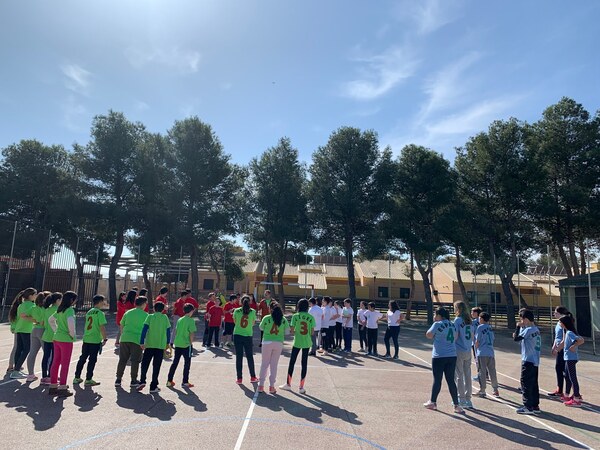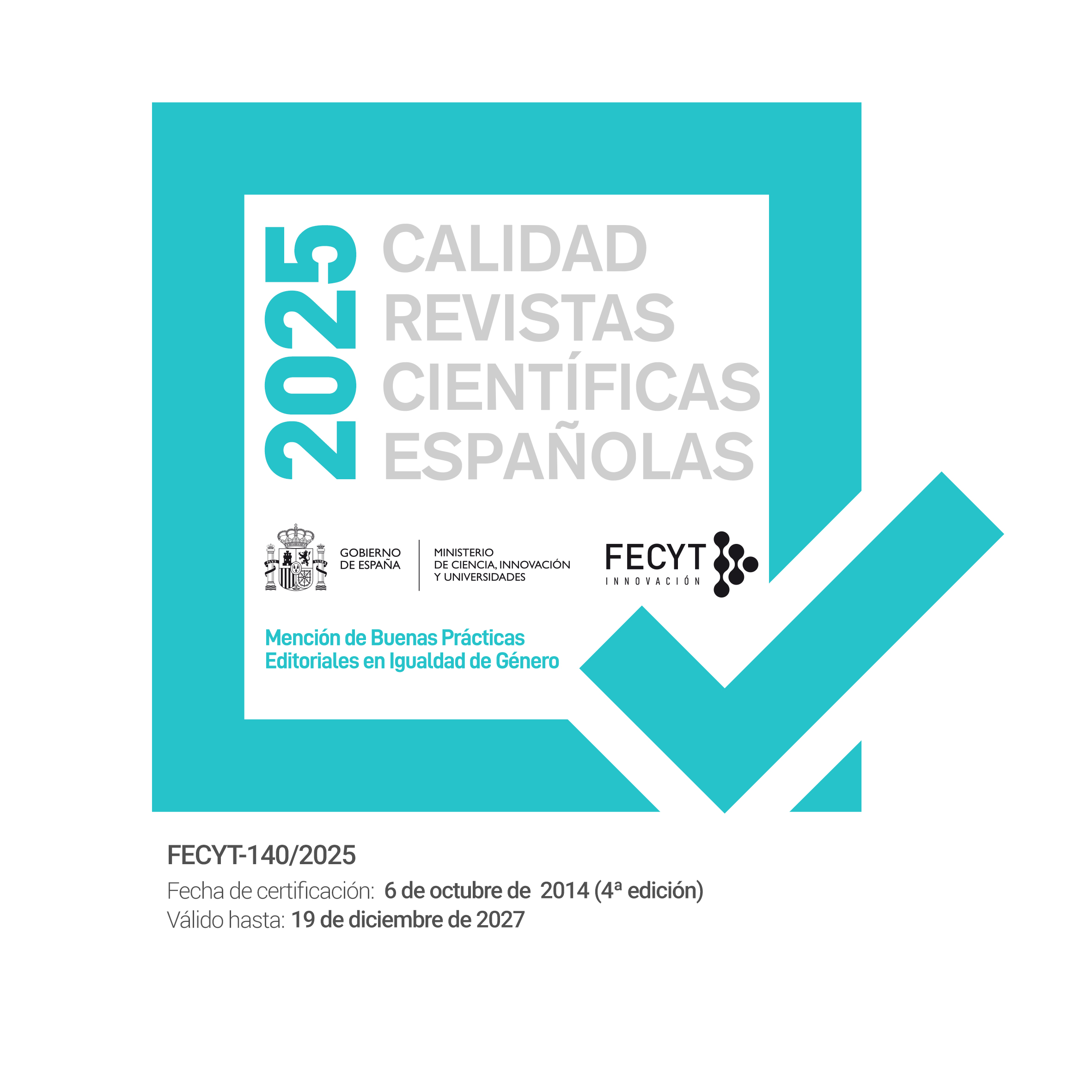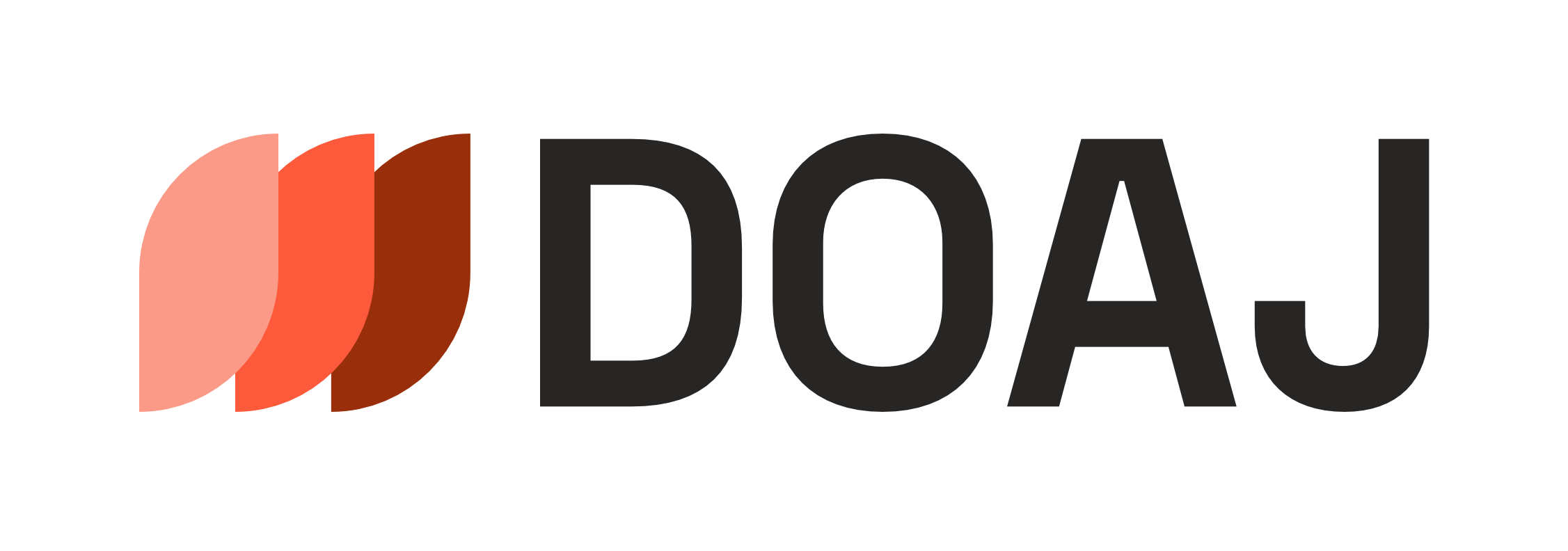Impacto de un programa de aprendizaje-servicio y educación deportiva sobre la competencia social y los aprendizajes
DOI:
https://doi.org/10.5944/educxx1.38229Palabras clave:
competencia social, aprendizaje-servicio, aprendizaje activo, educación deportiva, educación físicaResumen
El desarrollo de la competencia social (CS) se ha convertido en una prioridad para legisladores, educadores e investigadores. Entre las diferentes metodologías que han incidido positivamente sobre la CS destacan tanto el modelo pedagógico de Educación Deportiva (MED) como el Aprendizaje-Servicio (ApS). El objetivo de este estudio fue
conocer el impacto de un programa (MED-ApS) que hibridó ApS con el MED sobre la CS y los aprendizajes del alumnado. El diseño de investigación fue cuasiexperimental con grupo control y grupo experimental (receptores y prestadores del servicio), diferenciándose dos fases en cuanto a organización y participación. Se tomaron medidas antes de comenzar el programa, al finalizar la fase 1, y al concluir la fase 2. La fase 1 la completaron 478 estudiantes (276 de 6º Educación Primaria y receptores del servicio; 202 de 4º ESO y prestadores del servicio), mientras que ambas fases las concluyeron 337 (142 de 1º ESO y receptores del servicio; 195 de 1º Bachillerato y emisores del servicio). En la fase 1 se recogieron datos de los aprendizajes en la ejecución y toma de decisiones en el juego del ringo, así como de los conocimientos teóricos sobre técnica, táctica y reglamento. Ambas fases evaluaron la CS a través del Cuestionario Multidimensional de CS para Adolescentes (Gómez-Ortiz et al., 2017). Los resultados evidenciaron aprendizajes más destacados entre los participantes en el programa. El MED-ApS también fue efectivo, en su fase 2, en el desarrollo de la CS y sus dimensiones (Reevaluación Cognitiva, Ajuste Social, Eficacia Social, Ajuste Normativo) entre los emisores del servicio. Estos resultados sugieren que la combinación de estas dos metodologías ofrece un ecosistema de enseñanza-aprendizaje propicio para el desarrollo de aspectos socioemocionales y de aprendizajes inherentes al propio deporte, ofreciendo una experiencia positiva para todos, especialmente para los que prestan voluntariamente su servicio.
Descargas
Citas
Bailey, R., Armour, K., Kirk, D., Jess, M., Pickup, I., Sandford, R., & Education, B. P. (2009). The educational benefits claimed for physical education and school sport: an academic review. Research Papers in Education, 24(1), 1-27. https://doi.org/10.1080/02671520701809817
Browne, T. B., Carlson, T. B., & Hastie, P. A. (2004). A comparison of rugby seasons presented in traditional and sport education formats. European Physical Education Review, 10(2), 199-214. https://doi.org/10.1177/1356336X04044071
Cañadas, L. (2021). Aprendizaje-servicio universitario en contextos de actividad física, educación física y deporte: una revisión sistemática. Educacâo e pesquisa, 47, Artículo e237446. https://doi.org/10.1590/S1678-4634202147237446
Capella-Peris, C., Gil-Gómez, J., & Chiva-Bartoll, Ò. (2020). Innovative analysis of service-learning effects in physical education: a mixed-methods approach. Journal of Teaching in Physical Education, 39(1), 102-110. https://doi.org/10.1123/jtpe.2019-0030
Casado-Robles, C., Mayorga-Vega, D., Guijarro-Romero, S., & Viciana, J. (2022). Effect of a sport education-based teaching unit in physical education on high school students’ social networks and quantitative sociometry scores: a cluster randomized control trial. Revista de Psicodidáctica, 27(1), 66-75. https://doi.org/10.1016/j.psicoe.2021.10.001
Chiva-Bartoll, O., & Fernández-Rio, J. (2022). Advocating for service-learning as a pedagogical model in physical education: towards an activist and transformative approach. Physical Education and Sport Pedagogy, 27(5), 545-558. https://doi.org/10.1080/17408989.2021.1911981
Chiva-Bartoll, Ò., Capella-Peris, C., & Salvador-García, C. (2020a). Service-learning in physical education teacher education: towards a critical and inclusive perspective. Journal of Education for Teaching, 46(3), 395-407. https://doi.org/10.1080/02607476.2020.1733400
Chiva-Bartoll, O., Montero, P. J. R., Capella-Peris, C., & Salvador-García, C. (2020b). Effects of service learning on physical education teacher education students’ subjective happiness, prosocial behavior, and professional learning. Frontiers in Psychology, 11, 331. https://doi.org/10.3389/fpsyg.2020.00331
Chiva-Bartoll, O., Moliner, M. L., & Salvador-García, C. (2020c). Can service-learning promote social well-being in primary education students? A mixed method approach. Children and Youth Services Review, 111, Artículo 104841. https://doi.org/10.1016/j.childyouth.2020.104841
Evangelio, C., González-Víllora, S., Serra-Olivares, J., & Pastor-Vicedo, J. C. (2016). El modelo de educación deportiva en España: una revisión del estado de la cuestión y prospectiva. Cuadernos de Psicología del Deporte, 16(1), 307-324. https://bit.ly/3VCnZZG
García-López, L. M., & Gutiérrez, D. (2015). The effects of a sport education season on empathy and assertiveness. Physical Education and Sport Pedagogy, 20(1), 1-16. https://doi.org/10.1080/17408989.2013.780592
García-López, L. M., & Gutiérrez, D. (2017). Aprendiendo a enseñar deporte. Modelos de Enseñanza Comprensiva y Educación Deportiva (2ª ed.). INDE.
García-López, L. M., Gutiérrez, D., & Fernández-Bustos, J. G. (2019). Emprendimiento docente en la transición de educación primaria a educación secundaria: una propuesta desde la educación deportiva y el aprendizaje-servicio. Contextos Educativos: Revista de Educación, 24, 113-121. https://doi.org/10.18172/con.3913
García-López, L. M., Gutiérrez, D., González-Martí, I., Segovia, Y., & MacPhail, A. (2023). Enhancing sport education experiences through service-learning. European Physical Education Review, 29(2), 215-232. https://doi.org/10.1177/1356336X221132770
Gil-Gómez, J., Moliner-García, M. O., Chiva-Bartoll, Ó., & García-López, R. (2016). Una experiencia de aprendizaje-servicio en futuros docentes: desarrollo de la competencia social y ciudadana. Revista Complutense de Educación, 27(1), 53-73. http://dx.doi.org/10.5209/rev_RCED.2016.v27.n1.45071
Gómez-Ortiz, O., Romera-Félix, E. M., & Ortega-Ruiz, R. (2017). Multidimensionalidad de la competencia social: medición del constructo y su relación con los roles del bullying. Revista de Psicodidáctica, 22(1), 37-44. https://doi.org/10.1016/S1136-1034(17)30042-4
Grineski, S. (1996). Cooperative learning in physical education. Human Kinetics Publishers.
Gutiérrez, D., Segovia, Y., García López, L. M., & Fernández-Bustos, J. G. (2019). Integración del aprendizaje-servicio en el modelo de educación deportiva como facilitador de la transición a la educación secundaria. Publicaciones, 49(4), 87–108. https://doi.org/10.30827/publicaciones.v49i4.11730
Harvey, S., Kirk, D., & O’Donovan, T. M. (2014). Sport education as a pedagogical application for ethical development in physical education and youth sport. Sport, Education and Society, 19(1), 41-62. https://doi.org/10.1080/13573322.2011.624594
Hastie, P. A., & Buchanan, A. M. (2000). Teaching responsibility through SE: prospects of a coalition. Research Quarterly for Exercise and Sport, 71(1), 25-35. https://doi.org/10.1080/02701367.2000.10608877
Hastie, P. A., Sinelnikov, O. A., & Guarino, A. J. (2009). The development of skill and tactical competencies during a season of badminton. European Journal of Sport Science, 9(3), 133-140.
Holt, N. L. (Ed.). (2016). Positive youth development through sport. Routledge. https://doi.org/10.1080/17461390802542564
Kingery, J. N., & Erdley, C. A. (2007). Peer experiences as predictors of adjustment across the middle school transition. Education and Treatment of Children, 30(2),73-88. https://doi.org/10.1353/etc.2007.0007
Koszałka-Silska, A., Korcz, A., & Wiza, A. (2021). The impact of physical education based on the adventure education programme on self-esteem and social competences of adolescent boys. International Journal of Environmental Research and Public Health, 18(6), 3021. https://doi.org/10.3390/ijerph18063021
Leduc, C., & Bouffard, T. (2017). The impact of biased self-evaluations of school and social competence on academic and social functioning. Learning and Individual Differences, 55, 193-201. https://doi.org/10.1016/j.lindif.2017.04.006
Luna, P., Guerrero, J., Rodrigo-Ruiz, D., Losada, L., & Cejudo, J. (2020). Social competence and peer social acceptance: evaluating effects of an educational intervention in adolescents. Frontiers in Psychology, 11, 1305. https://doi.org/10.3389/fpsyg.2020.01305
Manninen, M., & Campbell, S. (2022). The effect of the sport education model on basic needs, intrinsic motivation and prosocial attitudes: a systematic review and multilevel meta-analysis. European Physical Education Review, 28(1), 78-99. https://doi.org/10.1177/1356336X211017938
Metzler, M. (2017). Instructional models in physical education. Routledge.
Monzonís, M., & Capllonch, M. (2014). La educación física en la consecución de la competencia social y ciudadana. Retos: Nuevas Tendencias en Educación Física, Deporte y Recreación, 25, 180-185. https://doi.org/10.47197/retos.v0i25.34509
Organization for Economic Co-operation and Development (2005). The definition and selection of key competencies: executive summary. https://bit.ly/3TVLLhU
Oslin, J. l., Mitchell, S. A., & Griffin, L. l. (1998). The Game Performance Assessment Instrument (GPAI): development and preliminary validation. Journal of Teaching in Physical Education, 17(2), 231-243. https://doi.org/10.1123/jtpe.17.2.231
Opstoel, K., Chapelle, L., Prins, F. J., De Meester, A., Haerens, L., van Tartwijk, J., & De Martelaer, K. (2020). Personal and social development in physical education and sports: a review study. European Physical Education Review, 26(4), 797-813. https://doi.org/10.1177/1356336X19882054
Padilla‐Walker, L. M., Fraser, A. M., Black, B. B., & Bean, R. A. (2015). Associations between friendship, sympathy, and prosocial behavior toward friends. Journal of Research on Adolescence, 25(1), 28-35. https://doi.org/10.1111/jora.12108
Pritchard, T., Hawkins, A., Wiegand, R., & Metzler, J. N. (2008). Effects of two instructional approaches on skill development, knowledge, and game performance. Measurement in Physical Education and Exercise Science, 12(4), 219-236. https://doi.org/10.1080/10913670802349774
Puig-Rovira, J. M., Batlle, R., Bosch, C., & Palos, J. (2007). Aprendizaje servicio: educar para la ciudadanía. Octaedro.
Ruiz-Montero, P. J., Santos-Pastor, M. L., Martínez-Muñoz, L. F., & Chiva-Bartoll, O. (2022). Influencia del aprendizaje-servicio universitario sobre la competencia profesional en estudiantes de titulaciones de actividad física y deporte. Educación XX1, 25(1), 119-141. https://doi.org/10.5944/educxx1.30533
Santos-Pastor, M. L., Cañadas, L., Martínez-Muñoz, L. F., & García-Rico, L. (2020). Design and validation scale to assess university service-learning in physical activity and sports. Educación XX1, 23(2), 67–93. http://doi.org/10.5944/educXX1.25422
Schueller, I., & Demetriou, Y. (2018). Physical activity interventions promoting social competence at school: a systematic review. Educational Rresearch Review, 25, 39-55. https://doi.org/10.1016/j.edurev.2018.09.001
Siedentop, D., Hastie, P. A., & van der Mars, H. (2020). Complete guide to sport education (3rd ed.). Human Kinetics.
Sinelnikov, O. A. (2009). Sport education for teachers: professional development when introducing a novel curriculum model. European Physical Education Review, 15(1), 91-114. https://doi.org/10.1177/1356336X09105213
Varela, D. C., Losada, A. S., & Fernández, J. E. R. (2019). Aprendizaje-servicio e inclusión en educación primaria: una revisión sistemática desde la educación física. Retos: Nuevas Tendencias en Educación Física, Deporte y Recreación, 36, 611-617. https://doi.org/10.47197/retos.v36i36.68972
Wang, B., & Chen, S. (2021). Sport education for social competence in K-12 physical education. Quest, 73(4), 391-409. https://doi.org/10.1080/00336297.2021.1986410
Weiss, M. R. (2011). Teach the children well: a holistic approach to developing psychosocial and behavioral competencies through physical education. Quest, 63(1), 55-65. https://doi.org/10.1080/00336297.2011.10483663
Whitley, M. A., Walsh, D., Hayden, L., & Gould, D. (2017). Narratives of experiential learning: students’ engagement in a physical activity-based service-learning course. Journal of Teaching in Physical Education, 36(4), 419-429. https://doi.org/10.1123/jtpe.2016-0141
Yorio, P. L., & Ye, F. (2012). A meta-analysis on the effects of service-learning on the social, personal, and cognitive outcomes of learning. Academy of Management Learning & Education, 11, 9–27. https://doi.org/10.5465/amle.2010.0072
Zhang, F., You, Z., Fan, C., Gao, C., Cohen, R., Hsueh, Y., & Zhou, Z. (2014). Friendship quality, social preference, proximity prestige, and self-perceived social competence: interactive influences on children’s loneliness. Journal of School Psychology, 52(5), 511-526. https://doi.org/10.1016/j.jsp.2014.06.001

Descargas
Publicado
Cómo citar
Número
Sección
Licencia
Derechos de autor 2024 Juan-Gregorio Fernández-Bustos, Luis Miguel García López, David Gutiérrez , Irene González-Martí, Jorge Abellán

Esta obra está bajo una licencia internacional Creative Commons Atribución-NoComercial 4.0.
La revista Educación XX1 se publica bajo licencia Creative Commons Reconocimiento-NoComerciaL 4.0 (CC BY-NC 4.0). Se permite la generación de obras derivadas siempre que no se haga un uso comercial. Tampoco se puede utilizar la obra original con finalidades comerciales.










